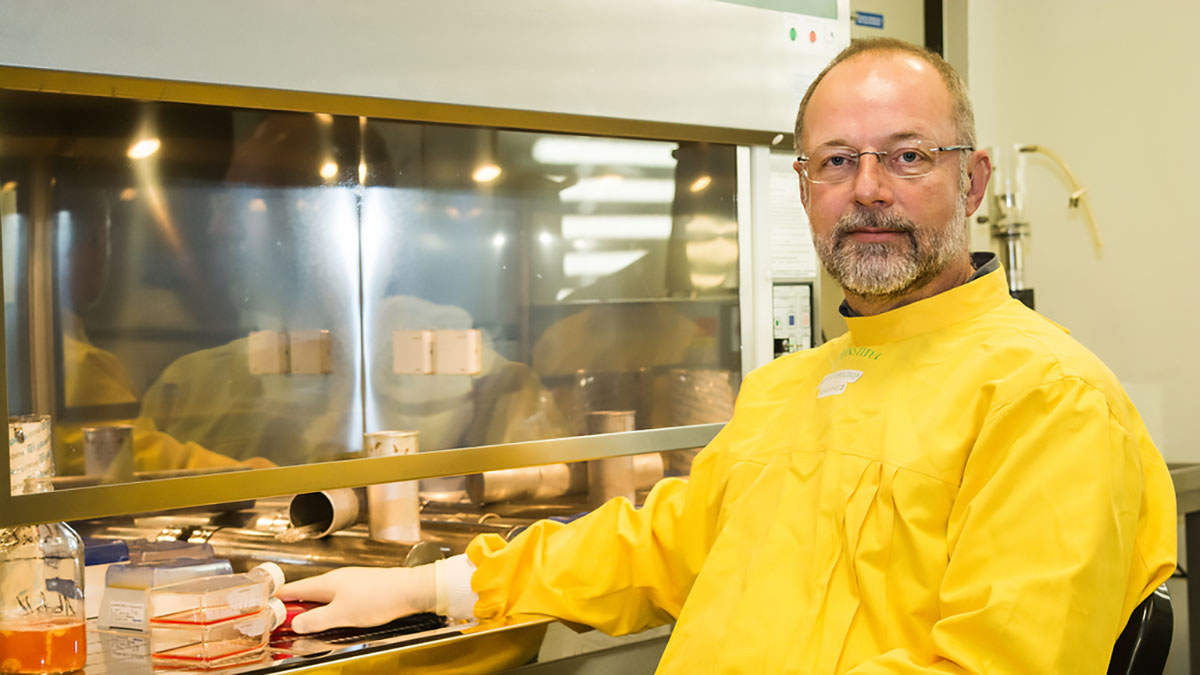
© Kai Uwe Bohn / Universität Bremen
“Sometimes Three or Four Interviews Each Day”
Good advice during the corona crisis: In the close to 50-year history of the University of Bremen, no expert has given as many interviews in such a short space of time as the virologist Professor Andreas Dotzauer
Expertise, advice, service: Being available with support for a wide range of people is part of day-to-day business for researchers and teaching staff at the University of Bremen. However, since the university’s establishment in 1971, no one has received quite as many inquiries from the media and the public as the virologist Professor Andreas Dotzauer. His answers to the numerous questions surrounding corona were and still are in demand.
Mr. Dotzauer, for you it seemed to go from 0 to 100 in only a few days in March 2020. How many inquiries have you had to answer as a virus expert since March 2020 – it’s now the end of October – and how many interviews have you given?
Andreas Dotzauer: I am not sure. I didn’t count. At the peak, when the crisis really got going, I was giving at least one interview per day – this is currently so as well. Sometimes, it was three or four each day. I have for long reached a three-figure amount.
What was the strain like? Did you sometimes ask yourself when it will finally all be over?
No, it didn’t go that far. I tried to control it all a little by being primarily available for the media in Bremen, Bremerhaven, and the region. I often declined inquiries from editorial teams from further afield. Outside of the actual interview there is a great deal of work to do as many journalists send me their questions. If you then have to answer them in writing, you think about what you actually write in great detail. And after telephone interviews, I asked that I was allowed to look at the text again. I wanted to make sure that I was cited correctly. All of that is time consuming.
What was your experience with the media like – good and bad?
I had no bad experiences really – rather experiences in general. For example, one of the things that I learned is that recordings are generally cut afterwards, and statements are therefore shortened. I had to make sure that some things were not taken out of context. What also happened was that sentences that I said to a media outlet here in the region, for example, were used, without my knowledge and in a different context, by another editor somewhere entirely different. You lose control of your own statements. I also made sure to only answer questions on virology and to not say anything about the economic or societal effects of the crisis.
“I deliberately did not answer questions about the effects of the crisis on the economy and society.”
At the beginning of the crisis, virologists and epidemiologists were in high demand but were then questioned and in some cases even treated with hostility. Some of your colleagues also ended up disagreeing and publicly argued in the media…
What the public did not understand is that everyone initially assesses the available data for him or herself. That can lead to differing observations. Additionally, virology and epidemiology are two different disciplines that carry differing points of view. However, the divergences were not that big in terms of the subject matter in my opinion. They only differed greatly when they were asked to look into a crystal ball – into the future – or when it was about the effects of the crisis on the economy and society. Obviously, there are a wide range of assessments. That is why I consciously chose to not answer such questions.
Your research focuses on hepatitis viruses. Have you been able to even concentrate on your own work?
Yes, it has been possible. But with the corona crisis, we virologists have a live occurrence that could never be replicated in a laboratory. That we are mainly dealing with that, are following the current happenings, are communicating with each other, and are investigating the data at the moment, is only natural. At present, the corona virus takes center stage in our interests.
What were your courses like in the summer semester? Was corona also a topic that was in focus? The students must have surely peppered you with questions.
As in other disciplines, our teaching was also carried out solely digitally with Zoom classes and much more. Our laboratory course hours always take place at the end of the semester so that we were then able to carry these out under adherence to the required protective measures at the university. It is obvious that corona was spoken about a great deal in the digital classes. Now in the winter semester, we are also starting again with online lectures, while internships are planned in attendance provided the appropriate conditions are met. We will have to see where this takes us.
And finally, a question on the topic itself: When do you estimate that this whole thing will be over?
I don’t know, especially, since the numbers are rising rapidly at the moment. The measures now being adopted – the so-called November Lockdown – are not a bad start. But in my opinion, they still fall short. Important areas are missing. Millions of people continue to go to work in companies, even in slaughterhouses, for example. Of course, they meet there, take coffee breaks, the canteens are staying open too. For this reason also, it is a fact that the virus will not disappear. In fact, it will remain with us for a long time to come.